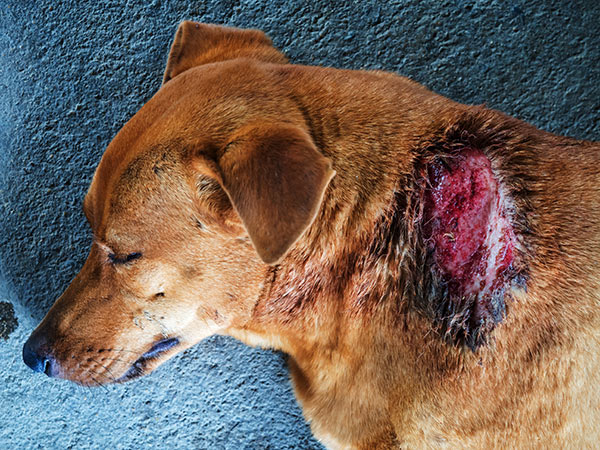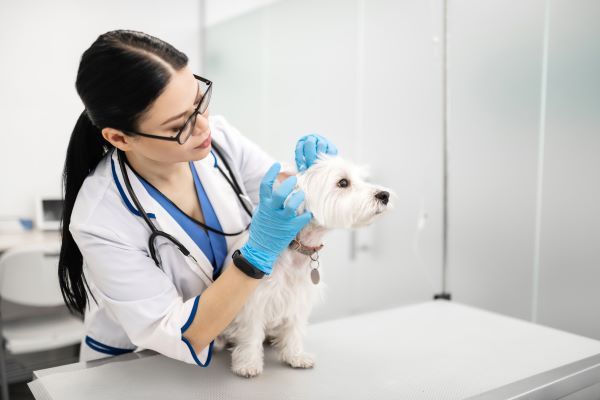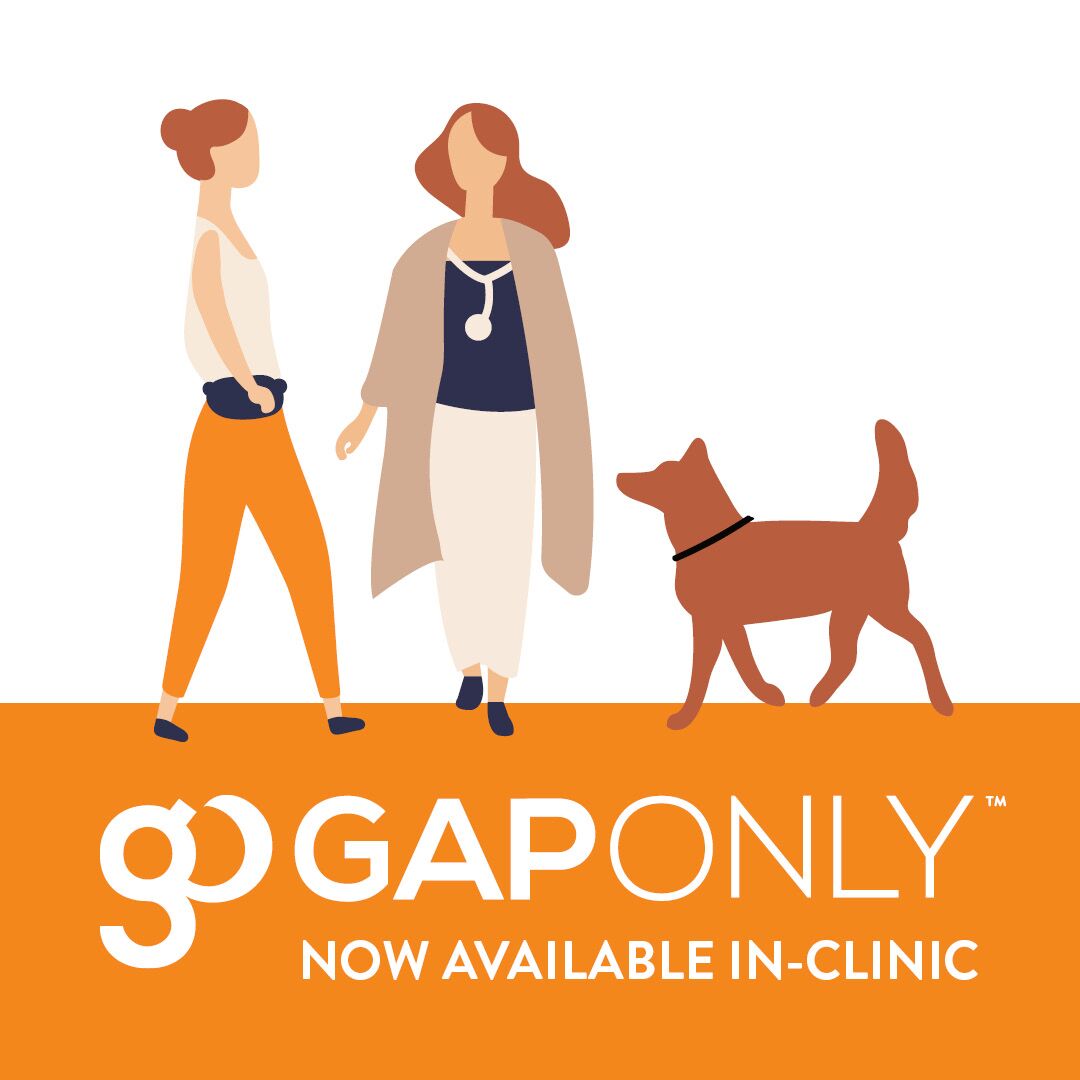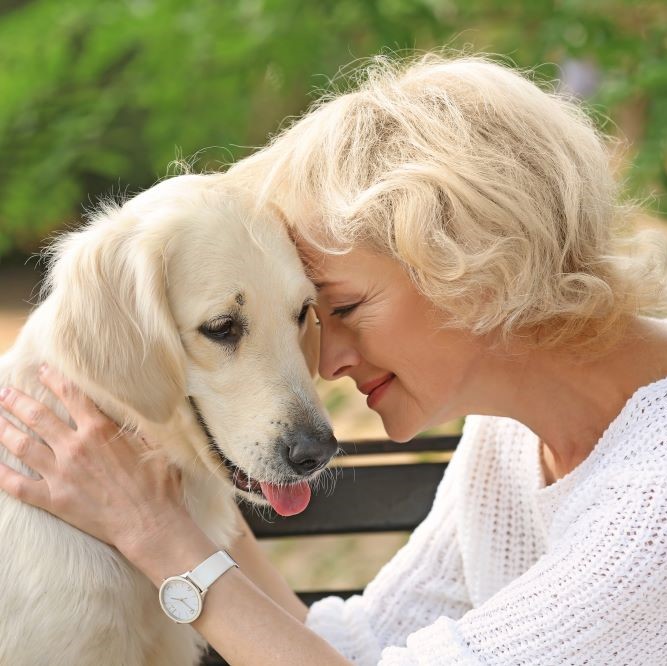The top 5 health problems for dogs

Our four-legged family members are an integral part of the family, and we love them like our own kids! To give them the best care, it’s important to be aware of the most common health conditions that affect dogs, so that we know what to look out for and catch any issues early.
The top 5 health conditions in dogs:
- Skin infections / allergies
- Gastrointestinal conditions
- Ear infections
- Wounds from traumatic injuries and fights / bites
- Mass lesions (lumps and bumps)
If you have a puppy, you may wish to read The top 5 health problems for puppies.
Why do dogs get sick?
Our fur babies can get sick for a variety of reasons, just like us. Despite our best efforts, health issues can crop up in dogs of all breeds and ages.
Dogs often explore the world with their mouths so it may not be surprising that gastrointestinal problems like diarrhoea and gastritis (inflammation of the stomach lining) are so common. Ear infections and skin allergies are other conditions that often affect dogs of all ages, while Osteoarthritis is the most common health condition in older dogs.
Because it is difficult to predict the costs of veterinary care, it can help to have measures in place to help prepare for the unexpected. Pet insurance can help by covering a portion of the eligible vet bill if the unexpected does happen.Find out more about our dog insurance options.
The most common dog health conditions
Prevention is always better than cure, so we also bring you top tips and advice on how to keep your fur baby safe and healthy.
With advances in veterinary care come increased costs of treatment. We let you know the average treatment cost and highest treatment cost of the most common dog health conditions, as per PetSure claims data from 2025.
1. Skin infections / allergies
- Average treatment cost: $667Ø
- Highest treatment cost: $21,209Ø
What are skin infections / allergies in dogs?
Taking first place on the list of top dog health conditions are skin infections / allergies. A skin allergy is a condition where the immune system is overly sensitive to a specific allergen, which brings on an allergic reaction in your dog’s skin. Plants, insect bites – especially flea bites – and foods are common allergens in dogs.
Skin allergies can range from minor itchiness or redness to chronic, severe or ongoing skin conditions. Being chronically itchy is very uncomfortable for your dog and they may scratch incessantly. Broken skin from scratching sets up a perfect environment for secondary bacteria to take hold, leading to a skin infection.
Skin infections and allergies in dogs can be complicated to diagnose and may require ongoing, long-term treatment.
Unsure how serious it is?
Bow Wow Meow policyholders can get access to trusted vet care anytime, anywhere, at no additional cost. Connect to an experienced Australian registered vet via video call, 24/7. Whether it’s providing vet advice, setting up at-home treatment plans, or confirming if you need to visit a vet in person, you can get help when you need it.
Find out more about our pet insurance cover options.

Preventing skin allergies in dogs
- Avoid any known allergens or environments that may trigger a reaction, including long grass with seeds, or pollen.
- Keep your pooch’s skin and coat clean and brush the coat regularly.
- A common cause of allergic reactions in dogs is flea bites, so stay up to date with flea treatment all year round.
- Examine your pup’s skin frequently to identify problems early.
- Feed a high-quality diet.
Learn more about dermatitis
Learn more about skin allergies
2. Gastrointestinal conditions
- Average treatment cost: $874Ø
- Highest treatment cost: $37,599Ø
What are gastrointestinal conditions in dogs?
Coming in second place in our list are gastrointestinal conditions in dogs. A gastrointestinal (GI) condition refers to a number of disorders that affect the digestive tract, including the stomach, intestines, and sometimes the oesophagus or colon.
These conditions can cause symptoms like vomiting, diarrhoea, loss of appetite, weight loss, abdominal pain, or excessive gas. Common GI issues include gastritis, gastroenteritis, pancreatitis, inflammatory bowel disease (IBD), food intolerances, and intestinal parasites.
While some cases are mild and resolve quickly, others may indicate a more serious underlying problem requiring veterinary care.

Preventing gastrointestinal conditions in dogs
- Feed a balanced, high-quality diet – Avoid sudden diet changes and ensure food meets your dog’s nutritional needs.
- Prevent access to spoiled or toxic foods – Keep garbage, table scraps, and toxic foods (e.g., chocolate, onions, grapes) out of reach.
- Practice good parasite control – Use regular worming and flea treatments to prevent intestinal parasites.
- Avoid foreign object ingestion – Keep small toys, bones, and other potential hazards away to prevent blockages.
- Provide fresh, clean water at all times – Supports healthy digestion and prevents dehydration.
- Schedule regular vet check-ups – Early detection and management of underlying issues can prevent serious GI problems.
Learn more about gastroenteritis in dogs
3. Ear infections
- Average treatment cost: $439Ø
- Highest treatment cost: $22,665Ø
What are ear infections in dogs?
Taking third place on the list of top dog health conditions are outer ear infections (also called otitis externa), which is the inflammation of the outer part of the ear canal.
Ear infections are usually painful and irritating for affected dogs. Their ears become red, swollen and will often produce an unpleasant smell and a dark or yellowish discharge. They may frequently shake their head and rub and scratch their ears.

Preventing ear infections in dogs
- Clean your dog’s ears every week or two and after they go swimming.
- Keep the ears of floppy-eared breeds as dry as possible.
- Ensure parasite treatment is up to date.
- Make sure any underlying skin allergies are treated.
- If you notice any of the signs mentioned above, seek veterinary advice right away.
Learn more about outer ear infections
4. Wounds from traumatic injuries and fights / bites
- Average treatment cost: $523Ø
- Highest treatment cost: $28,232Ø
What are wounds from traumatic injuries and fights / bites in dogs?
In fourth place,wounds from traumatic injuries and fights/bites in dogs are injuries to the skin and underlying tissues caused by accidents (like being hit by a car, falls, or sharp objects) or altercations with other animals.
Bite wounds, in particular, can be puncture-type injuries that may look small on the surface but often cause deep tissue damage and infection.
These wounds can range from minor scrapes to severe lacerations and may require cleaning, antibiotics, and sometimes sutures or surgery to heal properly.

Preventing wounds from traumatic injuries and fights / bites in dogs
- Supervise outdoor time – Keep dogs on a leash or in secure, fenced areas to prevent accidents or fights.
- Avoid dog parks if your dog is reactive – Reduce the risk of altercations with unfamiliar dogs.
- Socialize dogs gradually – Proper training and positive introductions lower the chance of aggression.
- Keep dogs away from hazards – Block access to sharp objects, machinery, or unsafe environments.
- Use secure transport – Restrain dogs safely in vehicles to prevent injuries during sudden stops or accidents.
- Desex when appropriate – Can reduce roaming and aggression linked to mating behavior.
- Monitor interactions with other animals – Especially around food, toys, or high-stress situations.
Learn more about wounds
5. Mass lesions (lumps and bumps)
- Average treatment cost: $961Ø
- Highest treatment cost: $31,195Ø
What are mass lesions (lumps and bumps) in dogs?
Mass lesions (lumps and bumps) in dogs are abnormal swellings or growths that can appear on or under the skin. They may be benign (non-cancerous, like fatty lumps or cysts) or malignant (cancerous tumours).
Causes include infections, inflammation, fatty tissue overgrowth, or cancer.
While many are harmless, any new or changing lump should be checked by a vet to diagnose the cause and decide if treatment or removal is needed.

Preventing mass lesions (lumps and bumps) in dogs
Most lumps and bumps (mass lesions) in dogs can’t be completely prevented, but you can reduce risk and catch problems early with these steps:
- Feed a balanced, high-quality diet – Supports overall immune health and reduces inflammation.
- Maintain a healthy weight – Obesity can increase the risk of fatty tumours (lipomas).
- Use parasite prevention – Prevents lumps caused by insect bites or tick-borne infections.
- Protect from injuries – Reduce trauma that can cause scar tissue or abscesses.
- Minimize toxin exposure – Avoid exposure to chemicals, secondhand smoke, and carcinogens.
- Perform regular at-home checks – Feel your dog’s body for new lumps or changes during grooming.
- Schedule routine vet check-ups – Allows early detection and treatment of abnormalities.
Learn more about mass lesions
A final word…
Taking positions 6 through to 10 in the most common health conditions in dogs are:
8. Musculoskeletal conditions (limping)
10. Dental problems
Knowledge is your best weapon in keeping your pooch safe and healthy throughout their life.
Knowing what to look out for and when to call the vet, and taking the necessary precautions to prevent illness or accidents from occuring, allows you to relax and enjoy your fur baby and be the best pet parent you can be!
ØBased on PetSure claims data, 2024 calendar year. Reimbursement for these claims under a pet insurance policy would be subject to limits, such as annual benefit limits or sub-limits, benefit percentage, applicable waiting periods and any applicable excess. Cover is subject to the policy terms and conditions. You should consider the relevant Product Disclosure Statement or policy wording available from the relevant provider. Please note that values calculated are based on all claims for that condition and medically related conditions in each calendar year.
Bow Wow Meow Pet Insurance can help protect you and your dog should an unexpected trip to the vet occur.
-
Find out more about our dog insurance options
-
Get an online pet insurance quote
Bow Wow Meow is proud to have been awarded winner of Canstar’s ‘Most Satisfied Customers’ Award in the Pet Insurance category for both 2024 and 2025!
Bow Wow Meow is proud to have been chosen as Product Review’s Pet Insurance Award Winner every year from 2018 to 2025! This is based on 2,995 independent customer reviews (as at 21/01/2025), with an overall rating of 4.3*
Google Review rating = 4.5* (based on 968 reviews)
Trust Pilot rating = 4.6* (based on 531 reviews)
Bow Wow Meow is proud to have been chosen as Product Review’s Pet Insurance Award Winner every year from 2018 to 2025! This is based on 2,995 independent customer reviews (as at 21/01/2025), with an overall rating of 4.3*
Google Review rating = 4.5* (based on 968 reviews)
Trust Pilot rating = 4.6* (based on 531 reviews)
Bow Wow Meow has been chosen as a winner in the Finder Pet Insurance Awards 2024. Finder’s panel of experts analysed over 140 quotes to award our Ultimate Care Plan the winner of the “Pet Insurance – Value” category.














